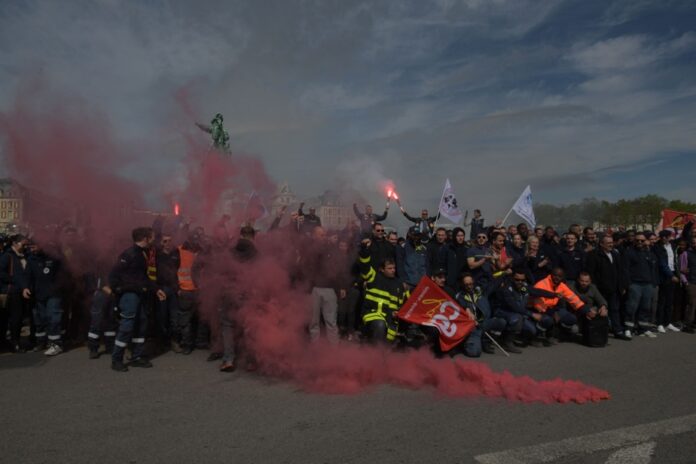(Montreuil) Masha Ciardi drinks a glass of white wine at the bistro located just at the foot of the tower of the General Confederation of Labor (CGT), at the gates of Paris. She did not steal it, after four months spent behind the scenes of the most important social movement of recent years.
The cafe doesn’t belong to the powerful syndicate – the oldest and most polarizing in France – but it’s just like. Trade unionists, “here, there is only that”, launches Dalia, the waitress. “We call it the annex,” says Ms. Ciardi, who holds an administrative position at the CGT. She adds with a laugh, “we’re captive customers.”
Ms. Ciardi, in her fifties and a communist, quickly evokes a period of “end of conflict”, before changing her mind. ” It continues. The objective is to continue the inter-union as much as possible; locally, it continues to move, “she moderates. Above his head and the counter, on mirrors, a plethora of red stickers of the various CGT federations. Railway workers, stevedores, oil workers: whatever it takes to paralyze France.
A France at a standstill is what is likely to happen this Monday.
“The fight must continue: the urgency is to increase all wages and not to raise the retirement age to 64,” proclaims the Intersyndicale, a grouping of the main French workers’ organizations, which leads the movement.
But faced with the government’s impassiveness in the face of the mobilization and the scarcity of opportunities to legally challenge the reform, French dailies are already talking about a “last stand”. Emmanuel Macron has already begun his “100 days of appeasement” to relaunch his five-year term.
For the moment, this “appeasement” does not benefit the eardrums of the head of state and the members of his government. In April, pot concerts accompanied each of their trips. “That shouldn’t stop us from moving forward. It’s not the saucepans that move France forward,” Emmanuel Macron even replied to the demonstrators who were noisily waiting for him in Alsace in mid-April.
Casserolades were also organized independently, near emblematic places of the French political landscape.
Last Monday, for example, they were several hundred to be gathered in front of the town hall of Paris, around 8 p.m., to be heard. Especially young people. The building – controlled by a socialist mayor – displayed large banners: “TOWN HALL SOLIDARITY WITH THE SOCIAL MOVEMENT”.
In the crowd, the demonstrators were trying to convince (and perhaps convince themselves) that the movement would continue.
“We’re very upset with Macron,” said Émile Kowalski, tapping on an old bottle of syrup, grenadine flavor. “Besides, today is the first anniversary of his re-election. A year of social breakdown, setbacks on all fronts. One wonders what he will still find to destroy. »
His comrade, Katell de Gouvelle, took over: “Public opinion remains the same. Afterwards, when people talk about shortness of breath, it may be because there are fewer people in demonstration. But you have to understand: I am a student, but my striking brother lost a month’s salary! So he went back to work because otherwise he can’t pay his rent. »
A few meters away, music teacher and musician Marie Labrousse took part in the most cacophonous concert of her career.
“If ever things run out of steam, there must be at least a few people who try to remind all the French people who were in the street that there was a problem,” she adds.
Madame Labrousse was tapping energetically on a little cul-de-poule. She sees the postponement of her future retirement age from 62 to 64 as an unfair punishment for wanting to “do something else” as early as 55 if possible. “It’s especially when you see that it’s not shared, that it’s always the same people who pay,” she continued. Puree, there are some who really do not do their part in France. Our very rich are under-taxed. »
All of them – Masha Ciardi like the demonstrators at City Hall – promised to demonstrate on Monday. To close a chapter of French social history or to write the sequel?


















